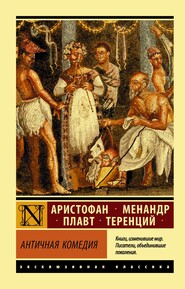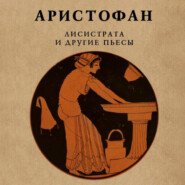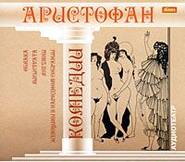По всем вопросам обращайтесь на: info@litportal.ru
(©) 2003-2024.
✖
The Eleven Comedies, Volume 2
Автор
Год написания книги
2018
Настройки чтения
Размер шрифта
Высота строк
Поля
CHORUS. Forward, forward, charge with your beaks! Come, no delay. Tear, pluck, strike, flay them, and first of all smash the stew-pot.
EPOPS. Oh, most cruel of all animals, why tear these two men to pieces, why kill them? What have they done to you? They belong to the same tribe, to the same family as my wife.[215 - Procné, the daughter of Pandion, King of Athens.]
CHORUS. Are wolves to be spared? Are they not our most mortal foes? So let us punish them.
EPOPS. If they are your foes by nature, they are your friends in heart, and they come here to give you useful advice.
CHORUS. Advice or a useful word from their lips, from them, the enemies of my forbears!
EPOPS. The wise can often profit by the lessons of a foe, for caution is the mother of safety. 'Tis just such a thing as one will not learn from a friend and which an enemy compels you to know. To begin with, 'tis the foe and not the friend that taught cities to build high walls, to equip long vessels of war; and 'tis this knowledge that protects our children, our slaves and our wealth.
CHORUS. Well then, I agree, let us first hear them, for 'tis best; one can even learn something in an enemy's school.
PISTHETAERUS. Their wrath seems to cool. Draw back a little.
EPOPS. 'Tis only justice, and you will thank me later.
CHORUS. Never have we opposed your advice up to now.
PISTHETAERUS. They are in a more peaceful mood; put down your stew-pot and your two dishes; spit in hand, doing duty for a spear, let us mount guard inside the camp close to the pot and watch in our arsenal closely; for we must not fly.
EUELPIDES. You are right. But where shall we be buried, if we die?
PISTHETAERUS. In the Ceramicus;[216 - A space beyond the walls of Athens which contained the gardens of the Academy and the graves of citizens who had died for their country.] for, to get a public funeral, we shall tell the Strategi that we fell at Orneae,[217 - A town in Western Argolis, where the Athenians had been recently defeated. The somewhat similar word in Greek, [Greek: ornithes], signifies birds.] fighting the country's foes.
CHORUS. Return to your ranks and lay down your courage beside your wrath as the Hoplites do. Then let us ask these men who they are, whence they come, and with what intent. Here, Epops, answer me.
EPOPS. Are you calling me? What do you want of me?
CHORUS. Who are they? From what country?
EPOPS. Strangers, who have come from Greece, the land of the wise.
CHORUS. And what fate has led them hither to the land of the birds?
EPOPS. Their love for you and their wish to share your kind of life; to dwell and remain with you always.
CHORUS. Indeed, and what are their plans?
EPOPS. They are wonderful, incredible, unheard of.
CHORUS. Why, do they think to see some advantage that determines them to settle here? Are they hoping with our help to triumph over their foes or to be useful to their friends?
EPOPS. They speak of benefits so great it is impossible either to describe or conceive them; all shall be yours, all that we see here, there, above and below us; this they vouch for.
CHORUS. Are they mad?
EPOPS. They are the sanest people in the world.
CHORUS. Clever men?
EPOPS. The slyest of foxes, cleverness its very self, men of the world, cunning, the cream of knowing folk.
CHORUS. Tell them to speak and speak quickly; why, as I listen to you, I am beside myself with delight.
EPOPS. Here, you there, take all these weapons and hang them up inside close to the fire, near the figure of the god who presides there and under his protection;[218 - Epops is addressing the two slaves, no doubt Xanthias and Manes, who are mentioned later on.] as for you, address the birds, tell them why I have gathered them together.
PISTHETAERUS. Not I, by Apollo, unless they agree with me as the little ape of an armourer agreed with his wife, not to bite me, nor pull me by the testicles, nor shove things up my….
CHORUS. You mean the…. (Puts finger to bottom.) Oh! be quite at ease.
PISTHETAERUS. No, I mean my eyes.
CHORUS. Agreed.
PISTHETAERUS. Swear it.
CHORUS. I swear it and, if I keep my promise, let judges and spectators give me the victory unanimously.
PISTHETAERUS. It is a bargain.
CHORUS. And if I break my word, may I succeed by one vote only.
HERALD. Hearken, ye people! Hoplites, pick up your weapons and return to your firesides; do not fail to read the decrees of dismissal we have posted.
CHORUS. Man is a truly cunning creature, but nevertheless explain. Perhaps you are going to show me some good way to extend my power, some way that I have not had the wit to find out and which you have discovered. Speak! 'tis to your own interest as well as to mine, for if you secure me some advantage, I will surely share it with you. But what object can have induced you to come among us? Speak boldly, for I shall not break the truce,—until you have told us all.
PISTHETAERUS. I am bursting with desire to speak; I have already mixed the dough of my address and nothing prevents me from kneading it…. Slave! bring the chaplet and water, which you must pour over my hands. Be quick![219 - It was customary, when speaking in public and also at feasts, to wear a chaplet; hence the question Euelpides puts. The guests wore chaplets of flowers, herbs, and leaves, which had the property of being refreshing.]
EUELPIDES. Is it a question of feasting? What does it all mean?
PISTHETAERUS. By Zeus, no! but I am hunting for fine, tasty words to break down the hardness of their hearts.—I grieve so much for you, who at one time were kings….
CHORUS. We kings! Over whom?
PISTHETAERUS. … of all that exists, firstly of me and of this man, even of Zeus himself. Your race is older than Saturn, the Titans and the Earth.
CHORUS. What, older than the Earth!
PISTHETAERUS. By Phoebus, yes.
CHORUS. By Zeus, but I never knew that before!
PISTHETAERUS. 'Tis because you are ignorant and heedless, and have never read your Aesop. 'Tis he who tells us that the lark was born before all other creatures, indeed before the Earth; his father died of sickness, but the Earth did not exist then; he remained unburied for five days, when the bird in its dilemma decided, for want of a better place, to entomb its father in its own head.
EUELPIDES. So that the lark's father is buried at Cephalae.[220 - A deme of Attica. In Greek the word ([Greek: kephalai]) also means heads, and hence the pun.]
EPOPS. Hence, if we existed before the Earth, before the gods, the kingship belongs to us by right of priority.











